

Most ebook files are in PDF format, so you can easily read them using various software such as Foxit Reader or directly on the Google Chrome browser.
Some ebook files are released by publishers in other formats such as .awz, .mobi, .epub, .fb2, etc. You may need to install specific software to read these formats on mobile/PC, such as Calibre.
Please read the tutorial at this link: https://ebookbell.com/faq
We offer FREE conversion to the popular formats you request; however, this may take some time. Therefore, right after payment, please email us, and we will try to provide the service as quickly as possible.
For some exceptional file formats or broken links (if any), please refrain from opening any disputes. Instead, email us first, and we will try to assist within a maximum of 6 hours.
EbookBell Team

4.7
56 reviewsThis book offers novel insights about the ability of a democracy to accommodate violence. In El Salvador, the end of war has brought about a violent peace, one in which various forms of violence have become incorporated into Salvadorans’ imaginaries and enactments of democracy. Based on ethnographic research, The Violence of Democracy argues that war legacies and the country’s neoliberalization have enabled an intricate entanglement of violence and political life in postwar El Salvador. This volume explores various manifestations of this entanglement: the clandestine connections between violent entrepreneurs and political actors; the blurring of the licit and illicit through the consolidation of economies of violence; and the reenactment of latent wartime conflicts and political cleavages during postwar electoral seasons. The author also discusses the potential for grassroots memory work and a political party shift to foster hopeful visions of the future and, ultimately, to transform the country’s violent democracy.